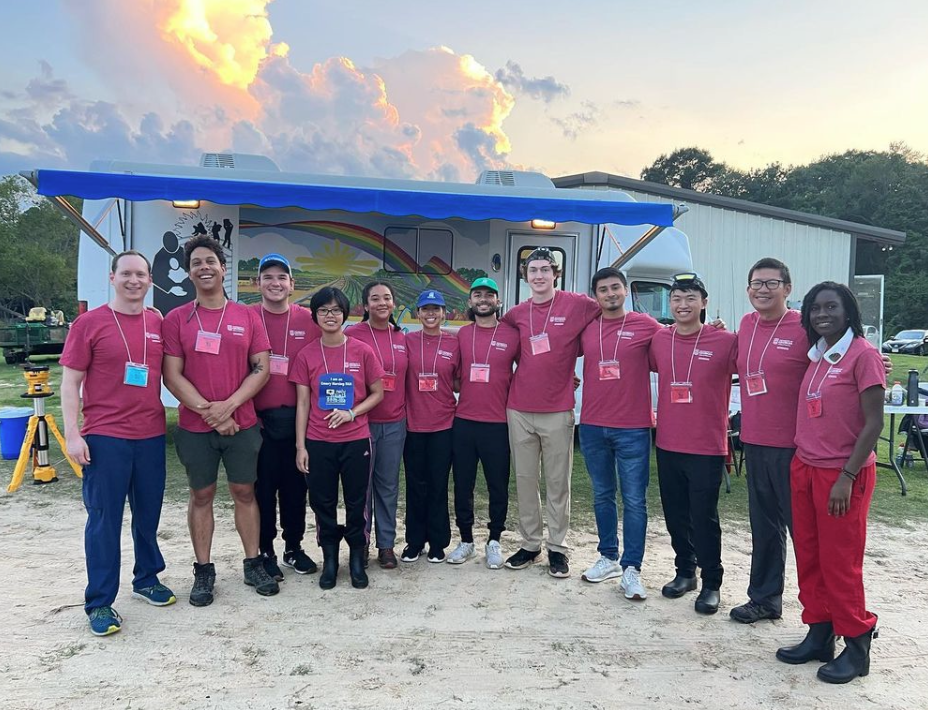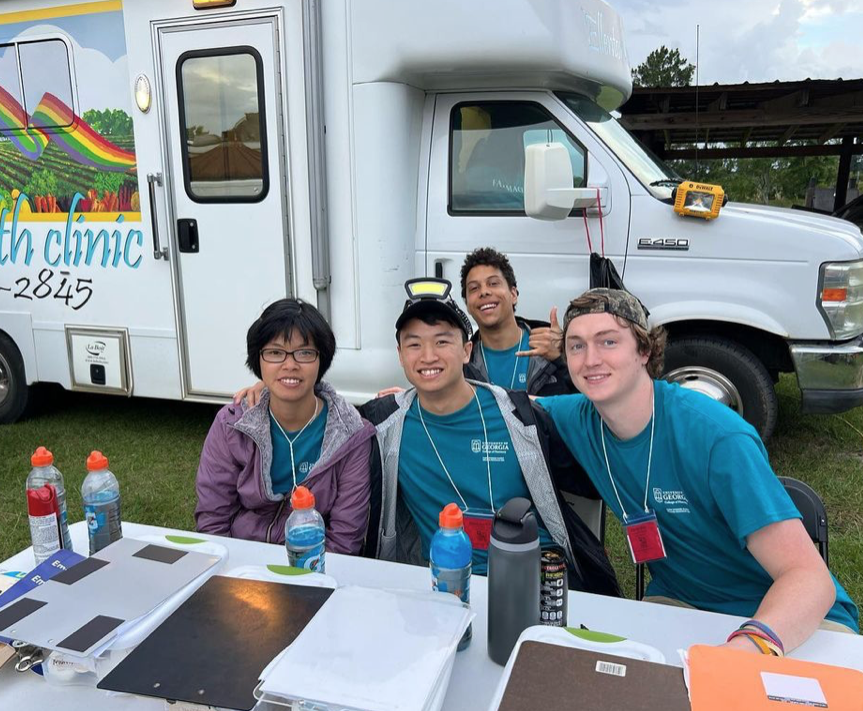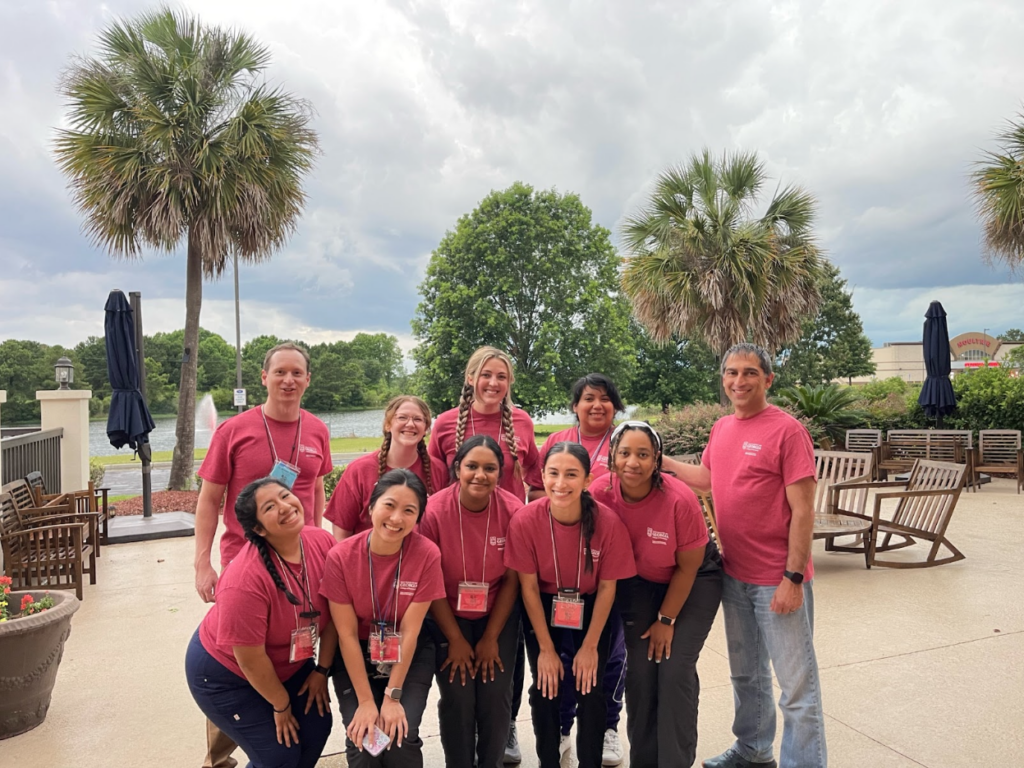By Catherine Lazenby
For three decades, the Farm Worker Family Health Program (FWFHP) has made a profound impact in rural southwest Georgia. The two-week volunteer service experience, held annually in June, brings together undergraduate and graduate students from interdisciplinary healthcare programs across the state to provide essential healthcare services to migrant farmworkers.
In the peak of summer growing season, farmers across Georgia employ hundreds of temporary workers to pick crops and package them for shipping. Migrant farmworkers make up an estimated 73% of agriculture workers in the United States today. Most of these men and women, along with their children, lack health insurance and are among the poorest workers in the nation. To bridge this healthcare gap, volunteer healthcare workers deliver community-based aid where it is most needed and where the population is most accessible: in the fields, camps, and school settings.
Students enrolled in pharmacy, nursing, physical therapy, dental hygiene, and psychology programs at colleges and universities across the state, including the UGA College of Pharmacy, collaborate interprofessionally to address primary healthcare concerns of the migrant families. The southwest Georgia area is extremely underserved by healthcare providers, and for some of the participants in the program, this is the only time they are able to receive free healthcare.
 In turn, the FWFHP provides an invaluable opportunity for students to gain clinical experience while fostering cultural understanding and empathy. “The Farm Worker Family Health Program is a wonderful professional development opportunity for PharmD students. Participants gain experience working as part of an interdisciplinary healthcare team, which is vital to their success as a future healthcare provider. But participants also gain necessary competence in cultural sensitivity and leadership by serving as advocates for a typically underserved population,” added Danielle Vitale, Director of Admissions and Career Development. Dr. Trina von Waldner, retired CoP Director of Continuing Professional Development and Outreach, initiated the College of Pharmacy’s participation in the FWFHP program several years ago, and continues to participate, even in retirement.
In turn, the FWFHP provides an invaluable opportunity for students to gain clinical experience while fostering cultural understanding and empathy. “The Farm Worker Family Health Program is a wonderful professional development opportunity for PharmD students. Participants gain experience working as part of an interdisciplinary healthcare team, which is vital to their success as a future healthcare provider. But participants also gain necessary competence in cultural sensitivity and leadership by serving as advocates for a typically underserved population,” added Danielle Vitale, Director of Admissions and Career Development. Dr. Trina von Waldner, retired CoP Director of Continuing Professional Development and Outreach, initiated the College of Pharmacy’s participation in the FWFHP program several years ago, and continues to participate, even in retirement.
A typical day for a UGA pharmacy student begins in the morning at a local elementary school serving the children of migrant families. Pharmacy students operate in a “chart room,” managing medical charts and records and escorting the children to screening stations. A variety of stations are set up around the elementary school, including physical therapy, vitalsigns, hearing and vision, and dental hygiene. After volunteering at the school, students travel to local churches, where they are provided with lunches prepared by the community. During their free time in the afternoon, they relax or explore the local area.
In the evenings, CoP PharmDawgs, along with fellow healthcare students from other universities, head back to work, providing on-site medical services to migrant workers at the local farms. All donated medications are utilized by the pharmacy students to create a drug formulary. These medications are organized each evening and loaded for transportation to the scheduled farms, via caravan. Upon arrival at the farm, the students set up the pharmacy in a mobile unit.
 Inside this pharmacy on wheels, some of the students type prescription directions in Spanish, the primary language of most of the migrant workers. At the production queue, students log, fill, and label each prescription received. Along with the pharmacy, the mobile unit includes an examination room where pharmacy students shadow nurse practitioner students on special cases, such as UTIs and basic wound care. Outside the mobile unit, students receive prescription order forms and act as drug information resources for nurse practitioner students and their faculty. Over-the-counter products are signed out, and patients are educated about their use. Volunteers work throughout the night until every patient receives their prescription and is counseled on the appropriate use of their medication.
Inside this pharmacy on wheels, some of the students type prescription directions in Spanish, the primary language of most of the migrant workers. At the production queue, students log, fill, and label each prescription received. Along with the pharmacy, the mobile unit includes an examination room where pharmacy students shadow nurse practitioner students on special cases, such as UTIs and basic wound care. Outside the mobile unit, students receive prescription order forms and act as drug information resources for nurse practitioner students and their faculty. Over-the-counter products are signed out, and patients are educated about their use. Volunteers work throughout the night until every patient receives their prescription and is counseled on the appropriate use of their medication.
“Each year, students come away with a greater respect for the food on their tables, because they are able to experience and see the amount of labor these migrant workers provide,” said Ann Manley, President of UGA’s National Hispanic Pharmacist Association (NHPA), the CoP organization that has been a leading force in the continuance of this program. “Usually, two pharmacy students participate in shadowing a migrant worker through the entire healthcare process each night. Having students go through the system allows them to speak to the patients and see how each station works. It is a privilege that we as volunteers and healthcare professionals are allowed to give back to a community that is the backbone of our daily lives.”
 Dr. Joshua Caballero, a CoP faculty member who served as a volunteer preceptor for the students, stated, “This is an opportunity to give back to the Georgia community and engage with other health practitioners in an interprofessional setting.”
Dr. Joshua Caballero, a CoP faculty member who served as a volunteer preceptor for the students, stated, “This is an opportunity to give back to the Georgia community and engage with other health practitioners in an interprofessional setting.”
The FWFHP is a federally funded outreach that originated in 1993 to provide primary health care to farm workers and their families. Operating through the Ellenton Rural Health Clinic in Colquitt County, Ga., the FWFHP services Colquitt, Cook, Tift, and Brooks counties. The program also serves as part of the clinical training programs of participating universities. In its three-decade history, the FWFHP has served more than 15,000 individuals.
This summer, the following National Hispanic Pharmacists Association (NHPA)-UGA members and other CoP students participated in the Farm Worker Family Health Program: Ananda Anderson, Mark Arthen, Kelly Bazel, Chris Cassara, Mathew Chin, Derrick Duarte, Linh La, Ann Manley, Sanika Mathew, James May, Stephanie Millan, Uyen Nguyen, Isis Salmon, Austin Seawright, Eboni Thomas, and Hannah Yonts. The UGA College of Pharmacy students were precepted by Dr. Caballero and Dr. William T. Huang, CoP faculty, as well as Emory’s pharmacology professor, Dr. Kenny Mueller, who also serves as a preceptor for UGA students’ advanced pharmacy practice experiences.

